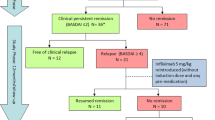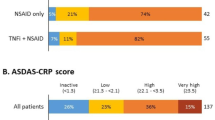Abstract
The objective of this study was to assess the effect of infliximab on depression, anxiety and quality of life in patients with active ankylosing spondylitis (AS). In this 6-week longitudinal study, 16 patients with AS were assessed. Active disease as defined by BASDAI ≥4.0 was sought for inclusion. Infliximab was administered 5 mg/kg at 0, 2 weeks and 6 weeks. Collected data included age, sex and date of onset of rheumatologic disease. Activity of disease was measured using Bath Ankylosing Spondylitis Disease Activity Index (BASDAI). Biological activity was evaluated with erythrocyte sedimentation rate (ESR) and C-reactive protein (CRP). ESR and CRP were assessed at baseline and day 42. The Hospital Anxiety and Depression scale (HADS), Beck Depression Inventory (BDI) and 36-item Short Form Health Survey (SF-36) were used to evaluate anxiety, depression and quality of life. BASDAI, SF-36, HADS and BDE were assessed prior to the initial infliximab dose and at 2nd, 14th and 42nd day. Seven (43.8%) AS patients had depression scores above the cut off value for both the HADS depression (HADS-D) and BDI and 4 (25 %) had high HADS anxiety scores at baseline. Significant time effect for BDI and HADS-D scores were observed. Although significantly lower BDI scores were found after first, second and third infusions of infliximab, compared to initial score, the significant decrease in HADS-D appeared after second and third infusions. A significant time effect for HADS-anxiety scores were found as well. All of the subscales of SF-36 improved significantly during the course, with an exception of role emotional, for which the difference approached to the significance. The change in BASDAI scores and CRP and ESR, in the treatment process, were not correlated with the change in depression and anxiety scores. Infliximab which is an anti-TNF-α drug, may be effective in the treatment of depression accompanying AS. Possible implications for the treatment of major depressive disorder were discussed, as well.

Similar content being viewed by others
References
Braun J, Sieper J (2007) Ankylosing spondylitis. Lancet 369:1379–1390
Barlow JH, Macey SJ, Struthers GR (1993) Gender, depression, and ankylosing spondylitis. Arthritis Care Res 6:45–51
Martindale J, Smith J, Sutton CJ, Grennan D, Goodacre L, Goodacre JA (2006) Disease and psychological status in ankylosing spondylitis. Rheumatology 45:1288–1293
Zink A, Braun J, Listing J, Wollenhaupt J (2000) Disability and handicap in rheumatoid arthritis and ankylosing spondylitis—results from the German rheumatological database. J Rheumatol 27:613–622
Evans DL, Charney DS, Lewis L et al (2005) Mood disorders in the medically ill: scientific review and recommendations. Biol Psychiatry 58:175–189
Raison CL, Capuron L, Miller AH (2006) Cytokines sing the blues: inflammation and the pathogenesis of depression. Trends Immunol 27:24–31
Alesci S, Martinez PE, Kelkar S, Ilias I, Ronsaville DS, Listwak SJ, Ayala AR, Licinio J, Gold HK, Kling MA, Chrousos GP, Gold PW (2005) Major depression is associated with significant diurnal elevations in plasma interleukin-6 levels, a shift of its circadian rhythm, and loss of physiological complexity in its secretion: clinical implications. J Clin Endocrinol Metab 90:2522–2530
Thomas AJ, Davis S, Morris C, Jackson E, Harrison R, O’Brien JT (2005) Increase in interleukin-1beta in late-life depression. Am J Psychiatry 162:175–177
Tuglu C, Kara SH, Caliyurt O, Vardar E, Abay E (2003) Increased serum tumor necrosis factor-alpha levels and treatment response in major depressive disorder. Psychopharmacology 170:429–433
Lanquillon S, Krieg JC, Bening-Abu-Shach U, Vedder H (2000) Cytokine production and treatment response in major depressive disorder. Neuropsychopharmacology 22:370–379
Kubera M, Maes M, (2000) Serotonin–immune interactions in major depression. In: Patterson, Kordon, Christen (eds) Neuro–immune interactions in neurologic and psychiatric disorders. Springer-Verlag, Berlin, pp 79–87
O’Brien SM, Scott LV, Dinan TG (2004) Cytokines: abnormalities in major depression and implications for pharmacological treatment. Hum Psychopharmacol 19:397–403
Persoons P, Vermeire S, Demyttenaere K, Fischler B, Vandenberghe J, Oudenhove LV et al (2005) The impact of major depressive disorder on the short- and long-term outcome of Crohn’s disease treatment with infliximab. Aliment Pharmacol Ther 22:101–110
Lichtenstein GR, Bala M, Han C, DeWoody K, Schaible T (2002) Infliximab improves quality of life in patients with Crohn’s disease. Inflamm Bowel Dis 8:237–243
Minderhoud IM, Samsom M, Oldenburg B (2007) Crohn’s disease, fatigue, and infliximab: is there a role for cytokines in the pathogenesis of fatigue? World J Gastroenterol 13:2089–2093
Tyring S, Gottlieb A, Papp K, Gordon K, Leonardi C, Wang A et al (2006) Etanercept and clinical outcomes, fatigue, and depression in psoriasis: double-blind placebo-controlled randomized phase III trial. Lancet 367:29–35
Van der Linden S, Valkenburg HA, Cats A (1984) Evaluation of diagnostic criteria for ankylosing spondylitis. Arthritis Rheum 27:361–367
Braun J, Pham T, Sieper J et al (2003) International ASAS consensus statement for the use of anti-tumour necrosis factor agents in patients with ankylosing spondylitis. Ann Rheum Dis 62:817–824
Akkoc Y, Karatepe AG, Akar S, Kirazli Y, Akkoc N (2005) A Turkish version of the Bath Ankylosing Spondylitis disease activity index: reliability and validity. Rheumatol Int 25:280–284
Zigmond AS, Snaith RP (1983) The hospital anxiety and depression scale. Acta Psychiatr Scand 67:361–370
Aydemir Ö, Güvenir T, Küey L, Kültür S (1997) The reliability and validity of Turkish form of Hospital Anxiety and Depression Scale. Turk psikiyatri Derg 8:280–287 (in Turkish)
Beck AT, Steer RA, Garbin MG (1988) Psychometric properties of the Beck depression inventory: twenty-five years of evaluation. Clin Psychol Rev 8:77–100
Hisli N (1989) Beck depression envanterinin üniversite öğrencileri için geçerliliği, güvenilirliği. A reliability and validity study of Beck Depression Inventory in a university student sample. J Psychol (Psikoloji Dergisi) 7:3–13 (in Turkish)
Koçyiğit H, Aydemir Ö, Ölmez N, Memiş A (1999) The reliability and validity of SF-36 for Turkish language. Ege Fizik Tedavi ve Rehabilitasyon Dergisi 12:102–106 (in Turkish)
Walker EA, Gelfand MD, Gelfand AN et al (1996) The relationship of current psychiatric disorder to functional disability and distress in patients with inflammatory bowel disease. Gen Hosp Psychiatry 18:220–229
Katon WJ, Ciechanowski P (2002) Impact of major depression on chronic medical illness. J Psychosom Res 53:859–863
Ware JE (1995) The status of health assessment 1994. Annu Rev Public Health 16:327–354
Beusterien KM, Steinwald B, Ware JE (1996) Usefulness of the SF-36 Health Survey in measuring health outcomes in the depressed elderly. J Geriatr Psychiatry Neurol 9:13–21
Coulehan JL, Schulberg HC, Block MR et al (1997) Treating depressed primary care patients improves their physical, mental, and social functioning. Arch Intern Med 157:1113–1120
Yonkers KA, Samson JA (2008) Mood disorders measures. In: Rush AJ, First MB, Blacker D (eds) Handbook of psychiatric measures, 2nd edn. American Psychiatric Publishing, Arlington VA, pp 499-528
Eren İ, Şahin M, Cüre E et al (2007) Interactions between psychiatric symptoms and disability and quality of life in ankylosing spondylitis patients. Arch Neuropsychiatry 44:1–9
Müller N, Schwarz MJ (2007) The immune-mediated alteration of serotonin and glutamate: towards an integrated view of depression. Mol Psychiatry 12:988–1000
Myint AM, Kim YK (2003) Cytokine-serotonin interaction through IDO: a neurodegeneration hypothesis of depression. Med Hypothesis 61:519–525
Zhu CB, Blakely RD, Hewlett WA (2006) The proinflammatory cytokines interleukin-1beta and tumor necrosis factor-alpha activate serotonin transporters. Neuropsychopharmacol 31:2121–2131
Raison C A study of infliximab for treatment resistant major depression emory university. http://clinicaltrials.gov/show/NCT00463580
Author information
Authors and Affiliations
Corresponding author
Rights and permissions
About this article
Cite this article
Ertenli, I., Ozer, S., Kiraz, S. et al. Infliximab, a TNF-alpha antagonist treatment in patients with ankylosing spondylitis: the impact on depression, anxiety and quality of life level. Rheumatol Int 32, 323–330 (2012). https://doi.org/10.1007/s00296-010-1616-x
Received:
Accepted:
Published:
Issue Date:
DOI: https://doi.org/10.1007/s00296-010-1616-x




